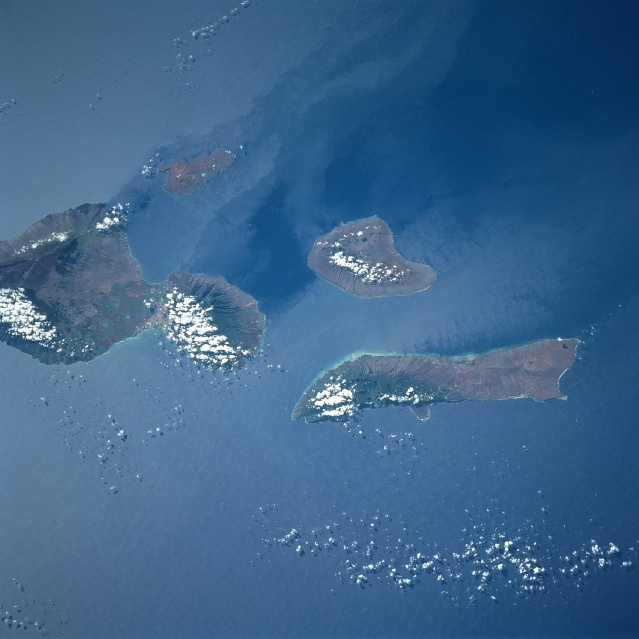
 Photo #: STS095-707-15 Date: Nov. 1998
Photo #: STS095-707-15 Date: Nov. 1998Geographic Region: USA-HAWAII
Feature: MOLOKAI, LANAI, MAUI

 Photo #: STS095-707-15 Date: Nov. 1998 Photo #: STS095-707-15 Date: Nov. 1998Geographic Region: USA-HAWAII Feature: MOLOKAI, LANAI, MAUI |
 |
| STS095-707-15 Lanai, Maui, and Molokai, Hawaiian Islands November 1998 The Hawaiian Islands of Maui, Kahoolawe, Lanai, and Molokai can be seen in this south-southwest-looking view. Maui (left center of the image) is the second youngest and second largest of the main Hawaiian Islands. Maui covers an area of 728 sq. miles (1886 sq. km). The island consists of two large volcanoes, West Maui (extinct) and East Maui, (Haleakala) which last erupted in 1790. Kahoolawe is the smallest of the four islands in the scene. It covers an area of 45 sq. miles (117 sq. km) and lies 10 miles (16 km) southwest of the southwestern Cape of Maui. Overgrazing and bombing by the military produced a red "Dust Bowl" in the center of the island. Lanai (near the center of the image), owned by the Dole Pineapple Company, is the remnant of a volcano that is over one million years old. Lanai covers an area of 141 sq. miles (365 sq. km) and is 18 miles (29 km) long and 13 miles (21 km) wide. Molokai (situated north of Lanai) covers an area of 261 sq. miles (676 sq. km) and is 38 miles (61 km) long and only 10 miles (16 km) wide, with the west end being very dry. During the 1997/1998 El Nino, the usual NE tradewinds were drastically reduced and even reversed at times. The low-level equatorial winds have remained near normal across the eastern Pacific, including Hawaii, since early June 98 and stronger than normal over the western Pacific. The islands are acting as a barrier to the NE winds and creating island wakes in both the atmosphere and ocean. |
| Images: | All Available Images Low-Resolution 275k |
|
| Mission: | STS095 |
|
| Roll - Frame: | 707 - 15 |
|
| Geographical Name: | USA-HAWAII |
|
| Features: | MOLOKAI, LANAI, MAUI |
|
| Center Lat x Lon: | 21.0N x 157W |
|
| Film Exposure: | N | N=Normal exposure, U=Under exposed, O=Over exposed, F=out of Focus |
| Percentage of Cloud Cover-CLDP: | 10 |
|
| Camera:: | HB |
|
| Camera Tilt: | 29 | LO=Low Oblique, HO=High Oblique, NV=Near Vertical |
| Camera Focal Length: | 250 |
|
| Nadir to Photo Center Direction: | S | The direction from the nadir to the center point, N=North, S=South, E=East, W=West |
| Stereo?: | N | Y=Yes there is an adjacent picture of the same area, N=No there isn't |
| Orbit Number: | 47 |
|
| Date: | 19981101 | YYYYMMDD |
| Time: | 203107 | GMT HHMMSS |
| Nadir Lat: | 23.7N |
Latitude of suborbital point of spacecraft |
| Nadir Lon: | 156.7W |
Longitude of suborbital point of spacecraft |
| Sun Azimuth: | 145 | Clockwise angle in degrees from north to the sun measured at the nadir point |
| Space Craft Altitude: | 293 | nautical miles |
| Sun Elevation: | 45 | Angle in degrees between the horizon and the sun, measured at the nadir point |
| Land Views: | ISLAND, VOLCANO |
|
| Water Views: | ISLAND WAKE |
|
| Atmosphere Views: | |
|
| Man Made Views: | |
|
| City Views: | |
|
Photo is not associated with any sequences | ||
| NASA Home Page |
JSC Home Page |
JSC Digital Image Collection |
Earth Science & Remote Sensing |
|
|